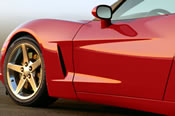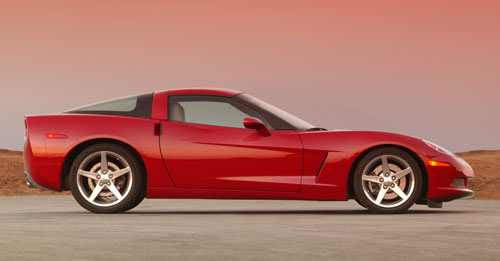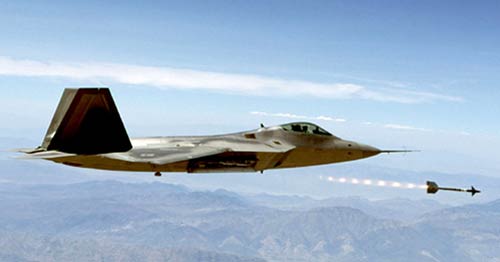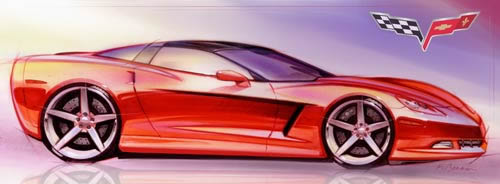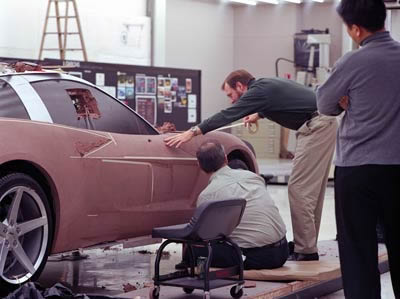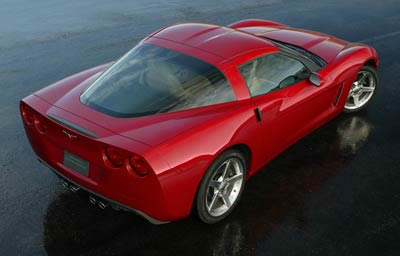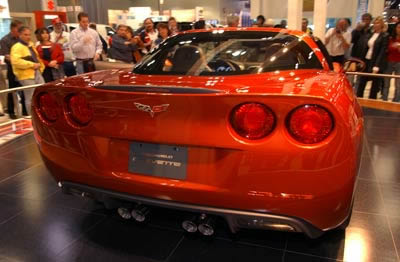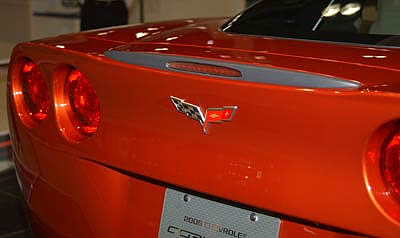C6, Naked and Exposed: Corvette Action Center's First Look at the 2005 Corvette - Page 2 of 6
 |
 |
C6, Naked and Exposed: Corvette Action Center's First Look at the 2005 Corvette - Page 2 of 6
by Hib Halverson
©2004 Corvette Action Center
No use without permission
C6 Exterior: F22 meets C3 - Continued from Page 1...
The side view. You see more C3 in how the high-peaked rear fenders extending onto the door skins. The B-pillar and the hatch glass have obvious C2 lineage. In doing the side-view of C6, Peters claims the U.S. Air Force F22 Raptor fighter jet influenced the Corvette designers. The Raptor's rounded, "stealth technology" surfaces can be sensed in an abstract sort of way when you look at an oh-five Vette.
Next, I stood about ten feet off the left-rear quarter. The styling of the rear deck is more sculpted with a slight, "dihedral" shape. After a 14-year hiatus, round taillights, classic Chevrolet style, are back. GM media information says of the lights: "Reflector optics give the illuminated taillamps a glow reminiscent of jet afterburners." Perhaps, that statement smacks of Chevy spin, but I've seen the lights on and that visual clue is pretty cool. Perhaps a result of what GM learned in the tunnel with the C5-Rs, there is a black defuser panel at the bottom of the rear fascia which also carries the back-up lights. In the middle of the defuser is an opening for the exhaust.
The most controversial aspect of C5's exterior was what some readers call a "fat ass." While I enjoyed the styling of the '97-'04 rear because it reminded me of the early-80s Corvette GTP race car, I'd be lying if I said I didn't know its styling was seen as a negative by a lot of people. The first thing a reader asked me about my recent C6 experience? "Does it still have a big butt?" Some of those who disliked the C5s rear, will be happier with the look of C6. While it is more visually complicated, the car's posterior doesn't appear as large. On the other hand, a few from the Kate Moss school of automotive exterior design will probably remain unhappy.
Finishing my walk-a-round from directly behind, I noted C5's trademark, quad exhaust is retained. I still wish it was two big pipes and not four little ones. I also saw another little quirk of the 2005's exterior: that strange mini-deck spoiler/CHMSL doodad. It's about a third of the car's width and is gray regardless of body color. The aftermarket's gonna make a mint selling them in colors. And...speaking of colors, for '05, exterior colors are: Precision Red (new), Daytona Sunset Orange (new), Machine Silver, LeMans Blue, Arctic White, Magnetic Red Metallic, Millennium Yellow and Black.
Bottom line: C5 was a tough act to follow, but Tom Peters and his team of designers have done a hell of a job in blending increased influence of past Corvettes, the theme set by the 1997 car a little bit of the C5-Rs and some new ambiance, with the result being C6 which is, well, like I said above...I'm stunned.
Inside the Oh-Five
There are no door handles and or locks anywhere on the exterior of the car. To get in it, slide your forefingers into a cavity at the upper-rear of the door and push a membrane switch on the inside of the door skin. A solenoid unlatches and the door pops ajar. The first time I did this I was just about speechless at the coolness of the process.
The rear hatch is also solenoid-released via the key fob or a button inside, but that was on C5. What's new is a power hatch "pull down". No more slamming it. Just close the hatch gently and pull-down, followed by latching is electric.
What happens when the battery goes dead? Dave Hill had left the building. A bunch of journalists and a few Chevrolet executives stood around shuffling their feet wondering about that until Corvette Marketing Manager, Rick Baldick, arrived on the screen, got the key, reached up under the license plate and inserted it into a hidden lock. A turn of the key and the hatch opens. Inside, on the back of the left fenderwell, are two pull-cables which manually release the driver's door and the gas filler.
The interior retains Corvette's classic "dual cockpit" layout a tradition since 1963. That retention was, according to Chevrolet, accompanied with three goals: maintain or improve the C5's already good ergonomics, use higher-quality materials, and execute the interior upgrade such that the occupants have a stronger feel of precision as they look at its surfaces and touch its controls. "The overall themes," said Eric Clough, lead interior designer, "were inspired by Corvette's dual-cockpit heritage, with a flowing, wraparound upper feature line and two-tone split between the instrument panel upper and lower. We wanted the surfacing to echo the high-tension character of the exterior to unify the whole car. The result lends spaciousness to the passenger and a nestled cluster pod for the driver. Switches and controls are located in modular groupings set into soft skin to reduce visual clutter."
Interior materials appear upgraded in their comfort and aesthetics. The instrument panel and doors are covered with cast-in-place, skinned foam which is soft to the touch and, to minimize glare, is low-gloss. It looks like a leather-wrapped, padded panel. GM claims this new material is "...warm and inviting..." and "...has twice the life of conventional automotive soft trim, resists fading and minimizes interior fogging, which occurs as plasticizers migrate out of the material. Aluminum trim plates with a woven-type, tactile surface add richness and emphasize the features they surround."
 |
 |
